

Politics, Political Change and International Development. The challenge of poverty reduction as a part of international development initiatives has preoccupied individuals, nonprofit organizations, and governments for more than half a century.
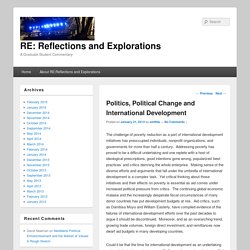
Addressing poverty has proved to be a difficult undertaking and one replete with a host of ideological prescriptions, good intentions gone wrong, popularized ‘best practices’ and critics damning the whole enterprise. Making sense of the diverse efforts and arguments that fall under the umbrella of international development is a complex task. Yet critical thinking about those initiatives and their effects on poverty is essential as aid comes under increased political pressure from critics.
The continuing global economic malaise and the increasingly desperate fiscal circumstances of many donor countries has put development budgets at risk. Could it be that the time for international development as an undertaking and an industry is coming to an end? [1] Mosse, D. (2010) . [2] Hickey, S. and S. Brendan Hall. Is It Time for a New Paradigm for "Citizen Engagement"? The Role of Context and What the Evidence Tells Us. The meteoric rise of "citizen engagement" Almost all development agencies promote some form of citizen engagement and accountability, often framed as 'voice', 'demand-side governance', 'demand for good governance' or 'social accountability'.
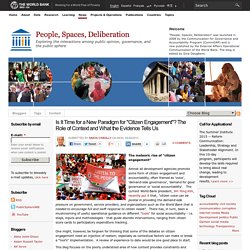
The current World Bank president, Jim Yong Kim, recently put it that, "citizen voice can be pivotal in providing the demand-side pressure on government, service providers, and organizations such as the World Bank that is needed to encourage full and swift response to citizen needs". There has, in turn, been a mushrooming of useful operational guidance on different "tools" for social accountability - i.e. steps, inputs and methodologies - that guide discrete interventions, ranging from citizen score cards to participatory expenditure tracking. One might, however, be forgiven for thinking that some of the debates on citizen engagement need an injection of realism; especially as contextual factors can make or break a "tool's" implementation.
So what?
Open Data at the World Bank: 2 years old today. Today is the second birthday of the Bank's Open Data Initiative—announced by the Bank's President, Robert Zoellick on April 20th, 2010: "It's important to make the data and knowledge of the World Bank available to everyone.
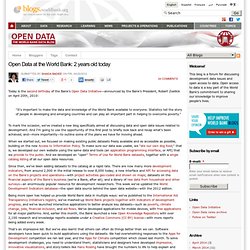
Statistics tell the story of people in developing and emerging countries and can play an important part in helping to overcome poverty. " To mark the occasion, we've created a new blog specifically aimed at discussing data and open data issues related to development. And I'm going to use the opportunity of this first post to briefly look back and recap what's been achieved, and—more importantly—to outline some of the plans we have for moving ahead. When we started out, we focused on making existing public datasets freely available and as accessible as possible, building on the new Access to Information Policy.
Since then, we've been adding datasets to the catalog at a rapid rate. That's an impressive list. So what's next? To provide better metadata. To be more local. ICTD 2012: Does Openness Enhance Development? - Open ICT for Development. This concept note is designed as a point of departure for thinking through the issues, including definitions, examples and further resources.
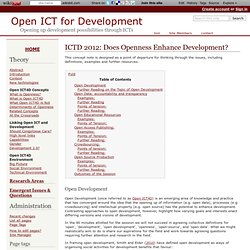
Open Development Open Development (once referred to as Open ICT4D) is an emerging area of knowledge and practice that has converged around the idea that the opening up of information (e.g. open data), processes (e.g. crowdsourcing) and intellectual property (e.g. open source) has the potential to enhance development. Contrasting approaches to open development, however, highlight how varying goals and interests enact differing versions and visions of development. In the 90 minutes allotted for the session we will not succeed in agreeing collective definitions for 'open', 'development', 'open development', 'openness', 'open-source', and ‘open data’.
What we might realistically aim to do is share our aspirations for the field and work towards agreeing questions requiring further attention and research in the field. Examples: Further Reading. Exploring the interactions among public opinion, governance, and the public sphere. Our Top Ten Blog Posts by Readership in 2012 Originally published on April 9, 2012 The emerging concept of “Open Development” has become a topic of keen interest to citizens, policy makers, and development practitioners alike.
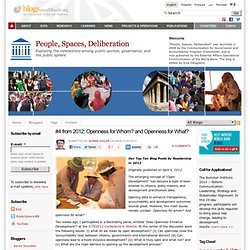
Opening data to enhance transparency, accountability and development outcomes sounds great. However, two main issues remain unclear: Openness for whom? And openness for what? Two weeks ago, I participated in a fascinating panel, entitled ‘Does Openness Enhance Development?’ What do we mean by Open Development? While Matthew Smith from the International Development Research Center (IDRC) stressed that ‘Open Development’ is still very much an emerging concept, he notes some key principles needed to transform development: 12271304441Open_ICT4D_Draft.pdf (application/pdf Object)